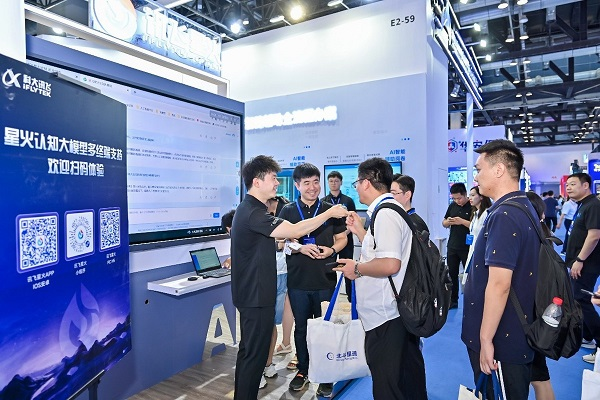iFlytek launches smart justice solutions
Updated: 2023-07-13
|chinadaily.com.cn
Chinese AI pioneer iFlytek, which is based in Hefei, capital of East China's Anhui province, showcased its latest solutions for smart justice at the 2023 Political and Legal Equipment Exhibition in Beijing from July 10 to 11.
The products it showcased included its iFlytek SparkDesk Cognitive Big Model Legal Consultation Scenario, Intelligent Assisted Case Handling, and Judicial Auxiliary Affairs and Big Data Supervision solutions.

Visitors gather at the booth of iFlytek at the Beijing exhibition. [Photo/ex.chinadaily.com.cn]
These solutions aim to empower judicial modernization, promote social governance, and enhance judicial fairness and justice in China.
One of the highlights of the exhibition was the iFlytek SparkDesk cognitive model, which demonstrated its ability to automatically generate complaints based on oral incidents.
The model uses language understanding, knowledge Q&A, and logical reasoning to generate lawsuits with necessary elements and formats.
iFlytek has been focusing on consolidating its smart judicial capabilities by leveraging artificial intelligence, big data, and cloud technology. It also plans to further explore and apply the cognitive model to provide legal advice and draft legal documents for civil disputes.

People talk about SparkDesk, iFlytek's in-house AI large language model, in Beijing. [Photo/ex.chinadaily.com.cn]
The company has developed an AI platform for various judicial scenarios such as trials, hearings, mediations, and conferences. Its solutions have been applied in 31 provinces across China.
iFlytek also showcased its digital intelligence solutions for judicial auxiliary affairs and digital rule of law supervision at the exhibition.
These solutions aim to reshape the organizational structure of auxiliary affairs, improve trial quality and efficiency, and enhance the management and supervision of the judicial system.
The company has already implemented these solutions in several courts, resulting in increased court utilization rates and shortened trial times.
